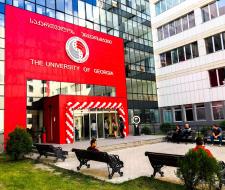Study in Tbilisi 2026
-

-
 from 750.00 € / year
from 750.00 € / year -
 from 3200.00 $ / year
from 3200.00 $ / year -
 from 1000.00 $ / year
from 1000.00 $ / year -

-
 from 2270.00 € / year
from 2270.00 € / year -
 from 3000.00 $ / year
from 3000.00 $ / year -
 from 5000.00 $ / year
from 5000.00 $ / year -
 from 6850.00 aed / 2 weeks
from 6850.00 aed / 2 weeks -
 from 700.00 $ / semester
from 700.00 $ / semester
Located in the Caucasus, where Europe meets the Middle East, Georgia is a small country with a rich history and culture, the birthplace of the Georgian language, one of the most interesting in the world. Bordered by Russia to the north and east, Azerbaijan to the southeast, Armenia to the south, Turkey to the southwest, and the Black Sea to the west, Georgia is a former Soviet republic that is fast becoming a major tourist destination. This is not only because of the old towns, hilly landscapes, and abundance of wine, but also because Georgia is an extremely affordable country.
It is also a country with good schools and excellent international connections.
Alternative destinations
Education System in Tbilisi
The capital, Tbilisi, serves as the country's center and is one of the most densely populated cities in Georgia.
Education in Georgia is both free and compulsory for children aged 6 to 16. However, similar to Russia, some educational institutions may require students to cover additional expenses such as textbooks, etc.
In the early years of the country's independence, the Georgian education system was considered corrupt and unjust. Following the so-called Rose Revolution, the Georgian education system was restructured and is currently evolving and improving rapidly. For instance, there are nationwide standardized exams for students who wish to enter any educational institution in Georgia, and all schools in the country adhere to a standardized student admission system. The academic year in Georgia starts in September and concludes in June.
The state education in Georgia consists of the following stages:
Kindergarten (2-5 years old).
Primary school (grades 1-4).
Secondary school (grades 5-9).
High school (grades 10-11).
Students aspiring to pursue higher education can choose from various courses and specializations, such as fine arts, science and technology, and Caucasian languages. Technical courses like chemical and food technology, winemaking, and railway transportation are also popular.
Both secondary and higher education institutions follow a standard grading system: 5 points represent the highest grade, 3 indicates a pass, and 1 signifies failure. In some cases, a grade of 0 (zero) may be used as the lowest, and 100 as the highest.
Education goes beyond regular day schools; there are boarding schools for children with disabilities and Youth Palaces that offer intensive courses in subjects like art, music, drama, and dance.
Students advance to the next grade based on their teachers' recommendations, which are determined by written work and participation throughout the year.
Only about 70% of students are accepted into higher education institutions. Graduates who do not successfully transition to the next level after completing secondary or high school may attend vocational-technical schools.
Higher Education in Tbilisi
The Georgian higher education system is proud of producing highly qualified, well-rounded professionals. Georgian schools have ties to universities such as Cambridge, Harvard, and Yale, allowing you to build a truly international network during your studies.
Higher education in Tbilisi comprises three stages:
Bachelor's program.
Master's program.
Doctoral program.
Only holders of state certificates confirming their completion of general education or equivalent are eligible to pursue a bachelor's program. Only bachelor's degree holders or equivalent degree holders are eligible for master's programs. The medical/dentistry education program is a single-stage higher education program that culminates in the award of the certified physician/dentist degree.
Upon completing each higher education stage, students receive the corresponding diploma. Higher education institutions can grant intermediate qualifications if students complete part of the educational program.
In Georgia, three types of higher education institutions exist:
University: Offers programs at all three higher education stages and conducts research.
Pedagogical University: Provides higher education programs (excluding doctoral programs). Must offer second-stage education programs—master's or additional education courses.
College: Offers only first-stage higher academic education programs.
Only diplomas issued by accredited or equivalent educational institutions are recognized by the state. In higher education institutions offering bachelor's programs, only applicants who pass the relevant Unified National Examinations according to the rules established by the Ministry of Education and Science of Georgia are eligible to enroll.
Top Educational Institutions in Tbilisi
-
Ivane Javakhishvili Tbilisi State University (TSU)
-
American University for Humanities (AUH)
-
Georgian Technical University
-
Caucasus University
-
Free University of Tbilisi
